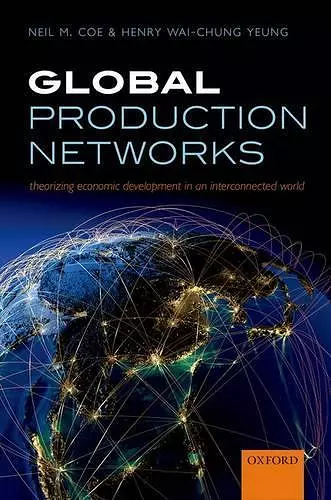Global Production Networks
Theorizing Economic Development in an Interconnected World
Henry Wai-chung Yeung author Neil M Coe author
Format:Hardback
Publisher:Oxford University Press
Published:30th Apr '15
Currently unavailable, and unfortunately no date known when it will be back
This hardback is available in another edition too:
- Paperback£37.49(9780198703914)

Accelerating processes of economic globalization have fundamentally reshaped the organization of the global economy towards much greater integration and functional interdependence through cross-border economic activity. In this interconnected world system, a new form of economic organization has emerged: Global Production Networks (GPNs). This brings together a wide array of economic actors, most notably capitalist firms, state institutions, labour unions, consumers and non-government organizations, in the transnational production of economic value. National and sub-national economic development in this highly interdependent global economy can no longer be conceived of, and understood within, the distinct territorial boundaries of individual countries and regions. Instead, global production networks are organizational platforms through which actors in these different national or regional economies compete and cooperate for a larger share of the creation, transformation, and capture of value through transnational economic activity. They are also vehicles for transferring the value captured between different places. This book ultimately aims to develop a theory of global production networks that explains economic development in the interconnected global economy. While primarily theoretical in nature, it is well grounded in cutting-edge empirical work in the parallel and highly impactful strands of social science literature on the changing organization of the global economy relating to global commodity chains (GCC), global value chains (GVC), and global production networks (GPN).
Coe and Yeungs Global Production Networks is a significant addition to the diverse and rapidly growing literature on international economic development . . . The book contains numerous insights and hypotheses that can guide future empirical research, and it is likely to both sharpen theoretical debates and offer grounds for constructive dialogue among the many scholars who look at economic development through the lens of inter-firm production networks. * Gary Gereffi, Professor of Sociology and Director of the Center on Globalization, Governance & Competitiveness, Duke University *
This book provides an important contribution to analysis of the growing complexity of global production networks. It is published at a key juncture given rapid expansion of consumer end-markets within the global South. Its exploration of the implications for uneven economic development is essential for assessing varied strategic options facing diverse actors in the contemporary global economy. * Stephanie Barrientos, Professor of Global Development, University of Manchester *
This book is a major and original contribution to the study of the global economy, and unique in the ways in which it provide a rigorous conceptual map of the dynamic and geographical complexities of the current global economy. It is, by far, the fullest and most significant book on global production networks to date. It is a major achievement and will be an important work in economic geography and economic sociology. * John Pickles, Earl N. Phillips Distinguished Professor of International Studies, University of North Carolina at Chapel Hill 20/04/15 *
Given the absence of a book-length treatment of GPN's by the extant literature, the value-add offered by Coe and Yeung in terms of delineating unified casual explainations for the rise and persistence of GPN's is timely and noteworthy. Across its six chapters, the book is cognizant of complementary aproaches, and seeks to inform subsequent empirical exploration by attempting conceptual development of the GPN framework. Coe and Young proceed to profile the actors involved in GPN's as well as the characteristics of these networks in Chapter 2. This is a key strength of the book, where the role of actors ex-firms such as the state, international organisations, and intermediaries are acknowledged and scrutinised for their impact on overall firm activity. Coe and Yeung have done an excellent job in illuminating a fundamental puzzle involving the evolution of production in the world economy, even as they develop a coherent theory of GPN's.
ISBN: 9780198703907
Dimensions: 237mm x 157mm x 24mm
Weight: 578g
288 pages